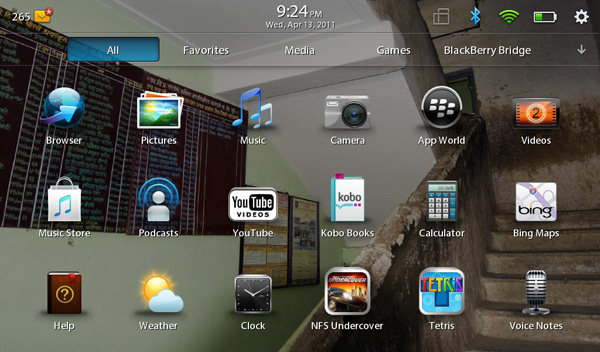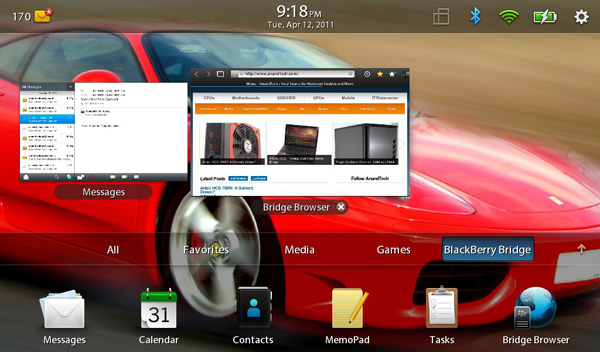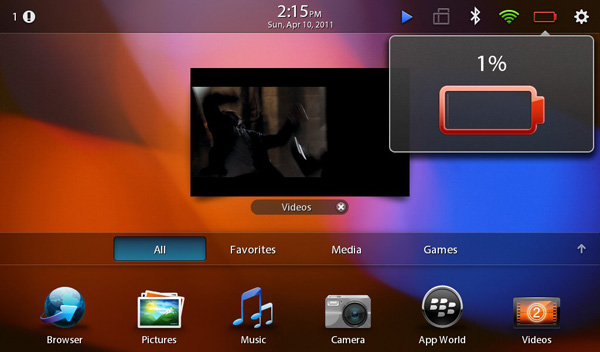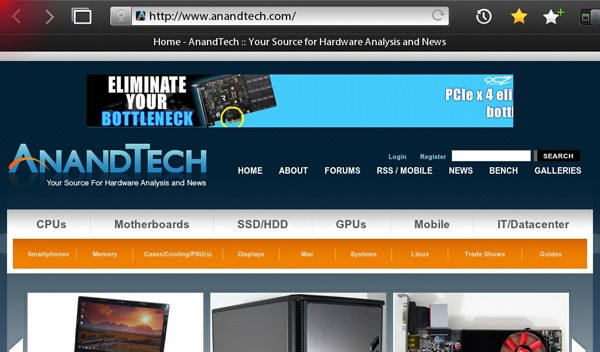The BlackBerry PlayBook Review
by Anand Lal Shimpi on April 13, 2011 9:00 PM EST- Posted in
- Tablets
- Smartphones
- RIM
- BlackBerry
- PlayBook
- Mobile
A New Home
Like many things, when talking about home screens there's a spectrum of options. On the simplest end we've got Apple with iOS, and for the ultimate in complexity there's a full blown desktop OS like Windows or OS X. In between there's Android and somewhere between iOS and Android we have the PlayBook OS.
The default home screen is your typical grid of apps. You can collapse the grid down to a single row of six icons in landscape mode, or view the full grid. RIM provides five tabs to help sort through apps: All, Favorites, Media, Games and BlackBerry Bridge (the latter only appears if you have Bridge enabled).
There's no support for folders, although you can rearrange icons and uninstall apps directly from the home screen the same way you would under iOS.
App launches are unfortunately a bit high latency. Select an app and you'll first see it launch as a thumbnail, then zoom in and finally run full screen. The whole process takes a couple of seconds but it feels longer than firing up similar iOS or Honeycomb apps.
Above the app grid is the multitasking UI, although you need to have at least one active app to see it in action:
Multitasking is smooth and well executed on the PlayBook. To switch between active apps just swipe left to right (starting from the left or right bezel, inner-screen swipes are application specific). You can also swipe up from the bottom bezel (the unlock gesture) while you're in an app to bring up a horizontal list of thumbnails of currently running apps. When in this thumbnail view you can swipe left to right to scroll through the list of apps, flick up (or hit the x) to quit apps and tap on a thumbnail to select and switch to an app. It's all clearly very webOS inspired, although I will say that webOS still feels a bit better in this regard.
Apps continue to run while you're deciding what to switch to. For example, if you're playing a video the player thumbnail will continue to animate while you select your next app. Only once you've selected that app will the video player pause.
RIM also gives you the option to control how background apps behave. By default background apps are paused once you switch away from them, however you can set them to keep running all the time or pause immediately upon activating the task switcher.
Scrolling through running apps is (for the most part) very smooth, with the UI running at 60 fps. The multitasking UI is extremely well done and honestly one of the most impressive parts of the PlayBook experience.
Notifications
With no email or calendar apps, the PlayBook doesn't have a whole lot to notify you of. Presently the only notifications the PlayBook will deliver have to do with remaining battery capacity.
Notifications on the PlayBook work by coloring a corner of the screen (I've seen this happen in both the upper left and upper right corners) if you're in a full screen app. Use the peek gesture to reveal the status bar and you'll see a little icon representing the app that spawned the notification. As I just mentioned, the only notifications that exist today are from the OS telling you that your battery is low but ultimately you'll see notifications from other first and third party apps here.
PlayBook's notification system is clearly a work in progress. Currently if you're charging a fully discharged PlayBook you'll get a notification every 1% between 0 and 6% telling you that the battery is low as you charge it. Also the only notification color supported today is red, which works well for "hey you're running out of battery life!" but not so well for "hey you just got 3 emails".
The notification system on the PlayBook has the potential to be decent. I expect that RIM will tweak the notification system over the coming months to accommodate other applications and services using it. The foundation is solid and RIM seems to be listening to feedback so I have hope for this working well.
There's also a notification LED on the front of the PlayBook, to the left of the front-facing camera. Today all it does is glow red when you turn on the PlayBook, but you can eventually expect it to have more BlackBerry-like functionality as RIM rolls out other things that can notify you (think emails).














77 Comments
View All Comments
Azethoth - Thursday, April 14, 2011 - link
That is a curious statement. What do you want lots of memory for?I can see memory being better for a phone that you listen to music from as more memory = more of your (compressed) library can fit on it. Personally I only sync particular playlists to my phone / iPad anyway.
As for other stuff, well apps just do not consume a large amount of space. For my iPad 2 I went with the smallest memory size. The larger size I have on my original, er I mean on my sister's "new" iPad, was just a waste for me.
Chloiber - Thursday, April 14, 2011 - link
Because it's an easy way to share things and upgrade your memory if you need more. I won't pay 100$ for 16GB of NAND flash (which cost's like 15$).jjj - Thursday, April 14, 2011 - link
For a device that can shoot and play 1080p video 16GB-64GB of storage is very little (and anything above 16GB is way too costly) Then there are also photos,music,apps that maybe soon will be actually able to do things and become bigger,it is after all a computing device and even if smartphones/tablets are in their infancy we can still hope that they mature sooner rather than later.BuffyzDead - Thursday, April 14, 2011 - link
"The screen is too small to comfortably read in portrait mode and even in landscape things can get a bit cramped." Steve Jobs already warned the entire industry on this point. It's too small to be a successful tablet. Everyone has portability in their Smartphone."Apple's A5 still has a much faster GPU" .and the playbook isn't even shipping yet
"App launches are unfortunately a bit high latency. .....whole process takes a couple of seconds but it feels longer than firing up similar iOS or Honeycomb apps." just throw more CPU at the problem. You know, down the road.
"With no email or calendar apps, the PlayBook doesn't have a whole lot to notify you of. Presently the only notifications the PlayBook will deliver have to do with remaining battery capacity." LOL at this one.
I predict Now, this thing will never sell in volume. Even improved versions down the road won't sell.
3 reasons:
1) It's too small.
2) The User Experience does not even come close to that of the iPad1
3) NO APPS
Yes, while there are company's that may force this down their employees throat, that is not where the growth of tablet use is coming from, in enterprise.
It's coming 100% from employees wanting to use their iPad's in the work environment.
You finish with:
"there are still more revolutions that will take place between now and when the mobile market finally matures"
Ask yourself, Honestly, is there ANYTHING about this "experiment for RIM"
that has an inkling of REVOLUTION ????
Azethoth - Thursday, April 14, 2011 - link
The proper quote is:"While Apple and Google are clearly out to a substantial lead, there are still more revolutions that will take place between now and when the mobile market finally matures. I'm not saying that Apple or Google won't end up on top, I'm just saying that it's not guaranteed they will either."
and
"The PlayBook is a reasonable experiment for RIM, but I need to see more to really recommend the tablet."
See how in context Anand makes sense? Rather than claiming the ridiculous: "this RIM tablet is a revolution", Anand is merely saying that this is an immature industry. Everyone fully expects actual game changing revolutions in this area in the future.
Search this site for Anand's excellent follow up to the iPad 2 release that asks: "How do I as a blogger use a tablet to create [text] content". There were some responses about maybe covers that double as keyboards. There was wishful thinking about voice input maturing real soon now. Mostly there is a need for some kind of interface revolution before a tablet can become a reasonable answer for a blogger on the go. These are the revolutions Anand needs in a tablet.
BuffyzDead - Thursday, April 14, 2011 - link
Correct !I wholeheartedly agree with Anand's review and conclusion:
There are no guarantee's what the future may hold and he can not recommend this Playbook.
1) I wanted to add that this Playbook will in fact be a total failure. Time will prove me right or wrong. Again, I predict Total Failure.
2) I wanted to point out how RIM, as is evident by this Playbook version 1,
has demonstrated Zero in it's capability to provide ANY REVOLUTION.
At most, it's an outright attempt to copy or emulate (poorly) what the iPad REVOLUTION IS.
BTW,
If you think that "designing a tablet" to cater to "the blogger on the go" is a measure of success, then I pray for RIM's sake, you are not on their design team.
Anand has repeatedly pointed out how a tablet might just not be for him, in general.
I have maintained for the past 15 months that the iPad's true REVOLUTION, is that it CREATED a NEW MARKET.
ALL of Apples competitors are playing catchup & copycat to cater to that NEW MARKET, which the iPad CREATED.
SandmanWN - Thursday, April 14, 2011 - link
For real... lay off the coffee and Jobs shlong.melgross - Thursday, April 14, 2011 - link
For real, it's the only tablet so far that sold more than a small number. As many others have pointed out, so far the tablet market is really the iPad market. Other manufacturers have to prove that they can sell a large number of devices. We know that the Tab, is not a real tablet by Google's standards, and that it sold in much smaller numbers than the number shipped to retailers and cell companies. The Xoom is assumed to have managed about 100,000 sales, and what else has there been that seriously competes?Now, the Playbook, which has been criticized by those in the industry for having poor battery life, and problems with the software before release, despite RIM,s denials, is proving, from all the reviews I've now read today, to be having all of those problems just days before release. Pogue has stated that RIM is feverishly sending out updated on a daily basis. That's not good.
Other tablets won't arrive for at least a couple more months.
So what does the market really consist of now?
melgross - Thursday, April 14, 2011 - link
It's hard to say. There are a lot of writers who have said that they type just fine on the iPad's virtual keyboard. Everyone's different. I remember a lot of people complaining about the first iPhone's keyboard, but since then, many, if not most new smartphones have no physical keyboards anymore, so people are getting used to them.I'm typing on my iPad2 now. The only complaints about the way Apple set it up are that I think that too much space is wasted on the two large numeric keyboard call up keys at the bottom of the keyboard, much of which could have been used for other functions, such as an "@" key, for instance. Otherwise, it's fine. On a 7" screen, typing for longer periods will be more problematical.
yelped - Thursday, April 14, 2011 - link
Stop trolling, and PLEASE grow up.Thanks.